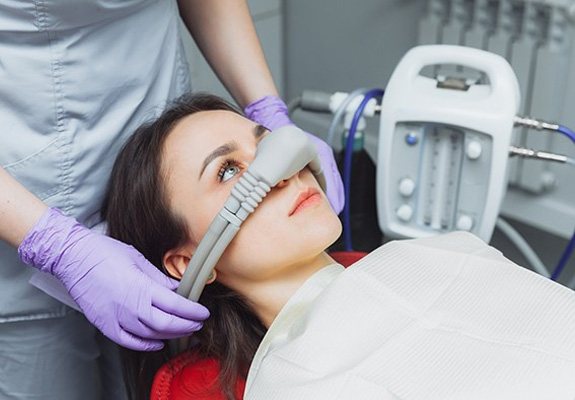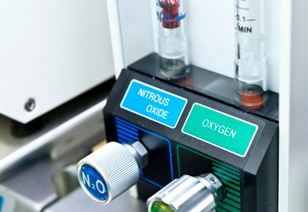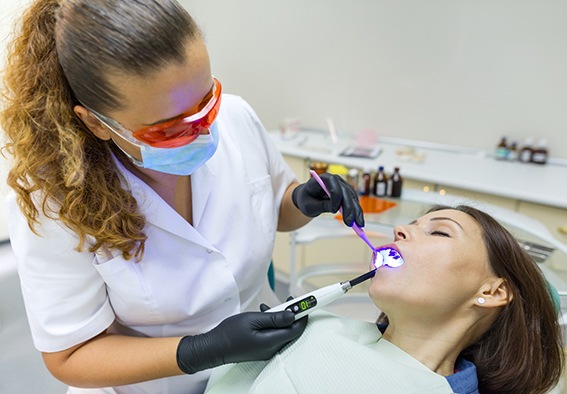Sedation Dentistry – New Braunfels, TX
Feeling Nervous? We’ll Help You Relax

When you realize you have a dentist appointment coming up, a feeling of dread may instantly engulf you. Rest assured – you’re not alone. Although it’s completely normal to feel nervous about your visit to the dentist’s office, it’s a problem if your anxiety is causing you to avoid necessary care. At Gruene Family Dental, your comfort is our number one priority, which is why we offer sedation dentistry in New Braunfels to help you relax. If you’d like to learn more about our services, continue reading or give our office a call today.
Nitrous Oxide Sedation

Mild dental anxiety can often be curbed with the use of nitrous oxide sedation. Known to benefit both children and adults, our team at Gruene Family Dental is capable of providing this method of sedation to anxious patients as well as those who have difficulty sitting for prolonged periods due to surgery or other health complication. With nitrous oxide, our team can provide the necessary treatment while you experience a more enjoyable and relaxing dental visit.
Who Is A Good Candidate for Nitrous Oxide?

Nitrous oxide is a great option for patients who have difficulty with numbing alone. Whether you’re having a standard dental cleaning or a more invasive procedure like dental implants, this sedative will quickly ease your nerves. Our team can easily adjust the level of sedation throughout any treatment to ensure you’re completely comfortable. Best of all, the effects will go away as quickly as they set in. You won’t have to worry about finding a friend or family member to drive you home.
You’ll likely be a candidate for nitrous oxide if you suffer from:
- A sensitive gag reflex
- Difficulty getting numb
- Mild or moderate dental anxiety
- A traumatic dental experience at another dentist’s office
- Difficulty remaining comfortable for prolonged periods
- Tooth sensitivity
- A fear of needles
How Does Nitrous Oxide Work?

Patients with mild cases of dental anxiety may only need nitrous oxide (or laughing gas) to help them get through their appointment. It’s a fast-acting sedative that’s administered using a small nose mask. Once it is placed over your nose, you will inhale the nitrous oxide gas that’s mixed with oxygen. Within seconds, you’ll begin to feel the effects. You may feel a lightness spread throughout your body, and your worries will melt away.
Many patients claim it feels almost euphoric, as they begin to relax while remaining cognizant of their surroundings. Because this form of sedation is mild, it does not fully sedate patients but instead, allows them to respond to cues from our dentist.
Aftercare for Nitrous Oxide

The aftercare instructions for nitrous oxide are minimal. Once the mask is removed and the gas is turned off, you will spend a few moments breathing in regular oxygen. You’ll quickly notice that the effects dissipate, allowing you to resume normal activity immediately following your appointment. As a result, you will not need anyone to escort you to and from your appointment but instead, you are free to return to work or school.
IV Sedation

Do you experience severe dental anxiety? Do you have physical or developmental disabilities that prevent you from sitting comfortably in a dentist’s chair for long periods of time? In either case, intravenous (IV) sedation may be an option worth exploring. It’s designed to make you feel drowsy during your appointment; you might even occasionally hear it referred to as “sleep dentistry.” Some patients claim it has an amnesiac effect, making them unable to remember parts of their visit.
What Is IV Sedation?

IV sedation is administered through a small needle that is inserted into a vein on the back of your hand or in the bend of your arm. Different medications can be used, but Midazolam and Diazepam are two of the most common. Within minutes after the medication is administered, you should begin to feel extremely relaxed. You might even drift off to sleep.
IV sedation is administered through a small needle that is inserted into a vein on the back of your hand or in the bend of your arm. Different medications can be used, but Midazolam and Diazepam are two of the most common. Within minutes after the medication is administered, you should begin to feel extremely relaxed. You might even drift off to sleep.
Who Is a Good Candidate for IV Sedation?

IV sedation might be suitable for you if:
- You struggle with moderate to severe dental anxiety or fear.
- You have a medical condition that makes it difficult for you to sit still in the dental treatment chair for an extended period of time.
- You do not readily respond to local anesthesia (it is difficult for you to get numb).
- You have an overly sensitive gag reflex.
- You do not have any contraindications that would make IV sedation too risky for you. For example, you should not be pregnant, and you should be free of certain allergies and respiratory conditions.
The Benefits of IV Sedation

IV sedation offers numerous benefits, including:
- It induces a deep state of relaxation that can allow you to undergo complex dental treatments that might otherwise instigate feelings of anxiety.
- It can allow our dental team to work as efficiently as possible. We may even be able to complete multiple procedures in a single appointment.
- It can be used for patients of virtually all ages, including children.
- Once it is administered, the effects kick in very quickly.
- It often creates an amnesiac effect that can allow you to forget the sights, sounds, and sensations that you experience while in the dental office.
Am I a Good Candidate for Sedation Dentistry?

Truthfully, almost any patient is a good candidate for sedation dentistry in New Braunfels. The only way to know for sure whether or not you’re eligible is by attending a consultation with our team. We’ll review your medical and health history to determine which method of sedation is best for you.
If you experience any of the following, you should consider exploring your sedation options:
- Sensitive gag reflex
- Physical disability that causes discomfort while sitting in the dentist’s chair
- Mild, moderate, or severe dental anxiety that often keeps you from pursuing regular oral care
- Preparing to undergo one or more dental procedures during one visit
- Fear of needles
- You’ve experienced trauma at a previous dental office
Sedation Dentistry FAQs
Is Sedation Dentistry Safe?
Yes, sedation dentistry is generally safe! In fact, nitrous oxide is considered the safest option for most patients. Before administering sedation, our team will review your medical history and medications for potential interactions. Throughout the procedure, we’ll closely monitor vital signs to ensure your safety. During your consultation, we’ll share our sedation-related experience and provide additional assurance of our ability to safely administer dental sedation.
Will I Remember Anything with Dental Sedation?
With most forms of dental sedation, you likely won't remember much of your procedure, even though you're technically awake. Under general anesthesia, you'll be fully unconscious, so you shouldn't remember anything. IV sedation is more likely to cause memory loss compared to oral conscious sedation and nitrous oxide. This memory loss effect significantly eases dental care for patients with extreme anxiety or negative past dental experiences.
Is Sedation Dentistry Covered by Insurance?
Sedation dentistry is often not covered by dental insurance plans, as it's considered a "luxury" treatment akin to cosmetic procedures. However, there are exceptions, such as cases where a patient has a disability (i.e., cerebral palsy, Parkinson’s, autism) that requires sedation for dental care.
Additionally, sedation may be covered for complex procedures like multiple tooth extractions. However, routine treatments like root canals or fillings usually aren't. Insurance coverage varies by plan, so it's essential to check your policy details. Our team can assist you in understanding your coverage and finding ways to make your care more affordable.
Does Dental Sedation Make You Tell Secrets?
Contrary to popular belief, dental sedation does not act as a "truth serum”. It's highly unlikely that you'll reveal deep secrets while under sedation. Even if you happen to say something out of the ordinary, rest assured that it will remain confidential within the confines of the dental treatment room. Your privacy and confidentiality are always respected during dental procedures involving sedation!
Will I Feel Any Pain with Dental Sedation?
Although nitrous oxide and IV sedation will keep you awake, they suppress your body's ability to feel pain. Any discomfort you may experience is likely to feel more like pressure rather than pain. Additionally, your dentist may administer a local anesthetic to numb your mouth, further preventing pain depending on the procedure.